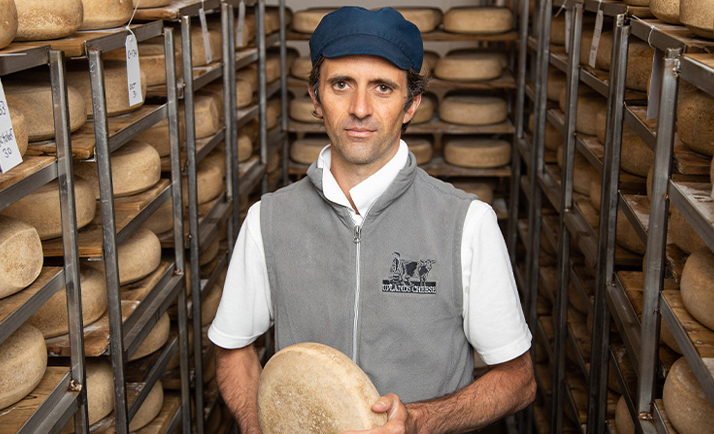A different way of slicing up business
When the pandemic hit, Uplands Cheese saw wholesale orders for their specialty cheeses drop. But Andy Hatch, who manages the creamery side of the business, noted an increase in retail orders from their website. Andy saw an opportunity to make up for the lost wholesale income with online retail sales—if they could handle the extra work that would come with it.
Looking down a different road
It was spring, well before the creamery’s pre-holiday busy season, so Andy and the other owners—his wife, Caitlin, and Scott and Liana Mericka, who manage the farm side of the business—decided to take a pause during July and August to plan how they would take on the extra work of increased online sales.
Until now, online sales had been only a small part of the business; shifting their focus from wholesale to retail sales would be a big change in their business model. That’s because processing and packaging retail orders takes significantly more work than wholesale ones. Instead of shipping whole wheels of cheese, cheese for retail sale needed to be sliced, wrapped and packaged. They needed to work as efficiently as possible.
Making space for more
It’s difficult for any business to scale up; it’s even more difficult to do it efficiently. As more online orders came in, Uplands Cheese kept running out of packaging materials because they weren’t used to the higher of demand. Plus, like most businesses during the pandemic, their supply chain had slowed significantly.
Andy began buying materials in larger quantities, which lowered the cost per item but required more storage space. In order for employees to keep a safe distance from each other while they packaged orders, they needed more space for working. Once orders were packaged, they needed to stay refrigerated until they could be delivered, which required more cooler space. Uplands Cheese realized their pandemic pivot just needed more room.
Adding to their facility, especially on such short notice, wasn’t an option. The creamery already had two shipping containers on the property that were used for storage. So it didn’t take long for them to realize they already knew the solution. The quickest, easiest and most affordable solution was to add a third, insulated shipping container. That extra space let employees stay socially distanced while packaging orders and gave them a place to store those orders until they could be shipped.
Sharing the bounty
In a typical year, Uplands Cheese would see about 1,000 wholesale orders, with some online retail orders on the side. In 2020, they filled 6,000 online orders, 4,000 of them in November and December alone.
Despite the extra work, retail orders provide a much higher profit margin than wholesale orders. And the We’re All Innovating grant funds made it possible to purchase the insulated shipping container to handle the extra orders that kept them going.
For Andy, the ability to slice their business into more, smaller orders also let them share a bigger piece of the pie—or in this case, cheese wheel—with the surrounding community. They were able to hire at close to normal levels for seasonal employees; they placed larger orders with suppliers like the local company they depend on for cardboard boxes; and they placed larger shipments with the local FedEx route operator.


